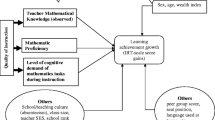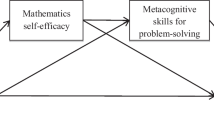Abstract
The purpose of this study was firstly to investigate the mathematical metacognitive characteristics of high-efficiency students by comparing high-efficiency and low-efficiency students. Secondly, the aim was to explore the pathways of mathematical metacognition of efficient mathematics learners in mathematics achievement. In this study, second-year Chinese middle school students were divided into a high-efficiency group (n = 297) and a low-efficiency group (n = 203) according to their learning efficiency in mathematics. The results indicated that the mathematical metacognitive knowledge and mathematical metacognitive monitoring of the students with high efficiency in mathematics learning were better than those of the other group. Their mathematical metacognitive characteristics were mainly reflected in the five dimensions of regulation, inspection, knowledge about individuals, knowledge about tasks, and knowledge about strategies. Furthermore, path analysis revealed that both mathematical metacognitive monitoring and mathematical metacognitive experience directly affected the mathematics achievement of students in the highly effective group. Mathematical metacognitive knowledge had an indirect effect on mathematics achievement. The findings imply that teachers should focus on the guidance of mathematical metacognition in mathematics instruction.



Similar content being viewed by others
References
Baten, E., & Desoete, A. (2019). Metacognition and motivation in school-aged children with and without mathematical learning disabilities in Flanders. ZDM Mathematics Education, 51(4), 679–689.
Bellon, E., Fias, W., & De Smedt, B. (2020). Metacognition across domains: Is the association between arithmetic and metacognitive monitoring domain-specific? PLoS ONE, 15(3), 1–19.
Bond, J. B., & Ellis, A. K. (2013). The effects of metacognitive reflective assessment on fifth and sixth graders’ mathematics achievement. School Science and Mathematics, 113(5), 227–234.
Brown, A. (1987). Metacognition, executive control, self-regulation, and other more mysterious mechanisms. In F. E. Weinert & R. Kluwe (Eds.), Metacognition motivation understanding (pp. 65–116). L. Erlbaum Associates.
Cohen, J. (1965). Some statistical issues in psychological research. Mc Graw-Hill.
Cohen, J. (1988). Statistical power analysis for the behavioral sciences. Lawrence Erlbaum Associates.
Cohors-Fresenborg, E., Kramer, S., Pundsack, F., Sjuts, J., & Sommer, N. (2010). The role of metacognitive monitoring in explaining differences in mathematics achievement. ZDM Mathematics Education, 42(2), 231–244.
Cook, D. A., Levinson, A. J., & Garside, S. (2010). Time and learning efficiency in Internet-based learning: A systematic review and meta-analysis. Advances in Health Sciences Education, 15(5), 755–770.
Cui, B., Li, J., & Wang, G. (2018). The design and compilation of the questionnaire of junior high school students’ mathematics metacognition Level. Journal of Mathematics Education, 27(3), 45–51. in Chinese.
Dong, Q. (1989). Discussion of metacognition. Journal of Beijing Normal University (social Sciences), 1, 68–72. in Chinese.
Flavell, J. H. (1976). The nature of intelligence. In L. B. Resnick (Ed.), Metacognitive aspects of problem-solving (pp. 231–236). Erlbaum.
Flavell, J. H. (1979). Metacognition and cognitive monitoring: A new area of cognitive–developmental inquiry. American Psychologist, 34(10), 906–911.
Gomes, C. M. A., Golino, H. F., & Menezes, I. G. (2014). Predicting school achievement rather than intelligence: Does metacognition matter? Psychology, 5(9), 1095–1110.
Hacker, D. J., Kiuhara, S. A., & Levin, J. R. (2019). A metacognitive intervention for teaching fractions to students with or at-risk for learning disabilities in mathematics. ZDM Mathematics Education, 51(4), 601–612.
Hobbs, J. R., & Gordon, A. S. (2006). Toward a large-scale formal theory of commonsense psychology for metacognition. In Paper presented at the 2005 AAAI Spring Symposium on Metacognition in Computation, March 21–23 2005, Stanford, California, USA.
Hoffman, B., & Spatariu, A. (2008). The influence of self-efficacy and metacognitive prompting on math problem-solving efficiency. Contemporary Educational Psychology, 33(4), 875–893.
Kaune, C. (2006). Reflection and metacognition in mathematics education—Tools for the improvement of teaching quality. ZDM Mathematics Education, 38(4), 350–360.
Kirschner, F., Paas, F., & Kirschner, P. A. (2011). Task complexity as a driver for collaborative learning efficiency: The collective working-memory effect. Applied Cognitive Psychology, 25(4), 615–624.
Kuhn, D., & Pearsall, S. (1998). Relations between metastrategic knowledge and strategic performance. Cognitive Development, 13(2), 227–247.
Künsting, J., Kempf, J., & Wirth, J. (2013). Enhancing scientific discovery learning through metacognitive support. Contemporary Educational Psychology, 38(4), 349–360.
Lucangeli, D., Fastame, M. C., Pedron, M., Porru, A., Duca, V., Hitchcott, P. K., & Penna, M. P. (2019). Metacognition and errors: The impact of self-regulatory trainings in children with specific learning disabilities. ZDM Mathematics Education, 51(4), 577–585.
Luwel, K., Torbeyns, J., & Verschaffel, L. (2003). The relation between metastrategic knowledge, strategy use and task performance: Findings and reflections from a numerosity judgement task. European Journal of Psychology of Education, 18(4), 425.
Ohtani, K., & Hisasaka, T. (2018). Beyond intelligence: A meta-analytic review of the relationship among metacognition, intelligence, and academic performance. Metacognition and Learning, 13(2), 179–212.
Osborne, R. J., & Wittrock, M. C. (1983). Learning science: A generative process. Science Education, 67(4), 489–508.
Özsoy, G. (2011). An investigation of the relationship between metacognition and mathematics achievement. Asia Pacific Education Review, 12(2), 227–235.
Panaoura, A., & Philippou, G. (2003). The construct validity of an inventory for the measurement of young pupils’ metacognitive abilities in mathematics. International Group for the Psychology of Mathematics Education, 3, 437–444.
Panaoura, A., & Philippou, G. (2007). The developmental change of young pupils’ metacognitive ability in mathematics in relation to their cognitive abilities. Cognitive Development, 22(2), 149–164.
Perels, F., Dignath, C., & Schmitz, B. (2009). Is it possible to improve mathematical achievement by means of self-regulation strategies? Evaluation of an intervention in regular math classes. European Journal of Psychology of Education, 24(1), 17–31.
Rasch, T., & Schnotz, W. (2009). Interactive and non-interactive pictures in multimedia learning environments: Effects on learning outcomes and learning efficiency. Learning and Instruction, 19(5), 411–422.
Schraw, G., & Dennison, R. S. (1994). Assessing metacognitive awareness. Contemporary Educational Psychology, 19(4), 460–475.
Shen, D., & Bai, X. (2006). The metal mechanism of high-efficiency learning. Journal of Psychological Science, 1, 2–6. in Chinese.
Tian, Y., Fang, Y., & Li, J. (2018). The effect of metacognitive knowledge on mathematics performance in self-regulated learning framework—Multiple mediation of self-efficacy and motivation. Frontiers in Psychology, 9, 2518. https://doi.org/10.3389/fpsyg.2018.02518
Vrugt, A., & Oort, F. J. (2008). Metacognition, achievement goals, study strategies and academic achievement: Pathways to achievement. Metacognition and Learning, 3(2), 123–146.
Wang, G., & Diao, Y. (2009). Psychological features of the high efficient mathematical learning. Journal of Mathematics Education, 18(5), 51–56. in Chinese.
Wang, G., She, W., Liao, J., & Wang, Z. (2017). Metacognitive characteristics of high school students for efficient mathematics learning and its pedagogical implications. Educational Science Research, 4, 46–53. in Chinese.
Wang, G., She, W., & Wang, Z. (2016). The questionnaire design of mathematics metacognition level for high school students. Studies of Psychology and Behavior, 14, 152–161. in Chinese.
Wilson, J., & Clarke, D. (2004). Towards the modelling of mathematical metacognition. Mathematics Education Research Journal, 16(2), 25–48.
Zhao, N., Teng, X., Li, W., Li, Y., Wang, S., Wen, H., & Yi, M. (2019). A path model for metacognition and its relation to problem-solving strategies and achievement for different tasks. ZDM Mathematics Education, 51(4), 641–653.
Acknowledgements
We are grateful to Dr. Lidong Wang from Beijing Normal University and Prof. Yuhuan Zhang from Henan University for their support and valuable comments on data collection and paper revision.
Funding
This research was funded by the Key Cultivation Project of Tianjin Teaching Achievement Award: Research and Development of Mathematics Learning Assessment Tool and Its Practical Application (PYJJ-036).
Author information
Authors and Affiliations
Corresponding author
Additional information
Publisher's Note
Springer Nature remains neutral with regard to jurisdictional claims in published maps and institutional affiliations.
Rights and permissions
About this article
Cite this article
Wang, G., Zhen, Y., Chen, X. et al. Mathematical metacognitive characteristics of Chinese middle school students in efficient mathematics learning. ZDM Mathematics Education 54, 543–554 (2022). https://doi.org/10.1007/s11858-022-01366-2
Accepted:
Published:
Issue Date:
DOI: https://doi.org/10.1007/s11858-022-01366-2




